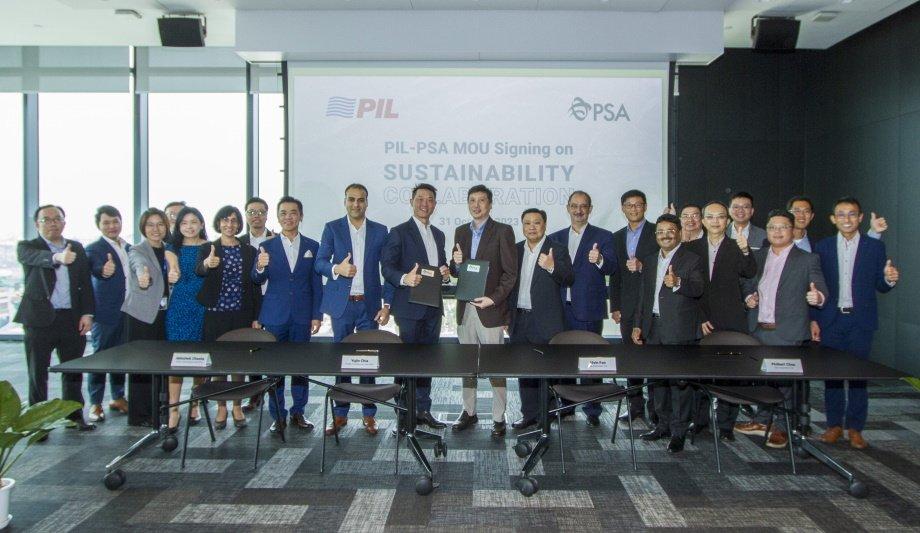In a collective journey towards achieving net zero greenhouse gases (GHG) emissions, PSA Singapore (PSA) and Pacific International Lines (PIL) have signed a Memorandum of Understanding (MoU) to jointly develop sustainable solutions to cut carbon emissions and optimise maritime efficiency.
The collaboration between the two long-time partners includes the development of a set of low carbon emission routes for containers shipped by PIL via PSA.
PSA Singapore and PIL sign MoU
Beyond the MoU, both partners are also cooperating in GHG emissions reduction levers
Beyond the MoU, both partners are also cooperating in GHG emissions reduction levers, such as the use of reclaimed refrigerant and the adoption of PSA’s OptEVoyage, a digital solution for vessels to arrive at the port just in time to achieve bunker savings and carbon emissions reduction.
PSA has extensive know-how and experience in container port operations and managing cargo flows, and PIL is the largest home-grown carrier in Southeast Asia with strong networks in Asia, Africa, Middle East, Latin America and Oceania.
Share common goal to achieve net zero emissions by 2050
The two majors in their respective fields, with a common goal to achieve net zero emissions by 2050, will leverage each other’s expertise, resources and innovation to work towards developing low carbon pathways.
In April 2022, PIL successfully conducted a biofuel trial using a blend of fatty acid methyl esters (FAME) and very low sulfur fuel oil (VLSFO).
Encouraged by the results, PIL intends to trial another blend of biofuel on its Singapore Qinzhou Shuttle (SQS) service as part of this MOU. This trial will involve a blend of 24% FAME with VLSFO.
Steps to reduce carbon emissions in the shipping industry
It is imperative that we take proactive steps to reduce carbon emissions throughout the shipping industry"
Mr. Nelson Quek, Regional CEO Southeast Asia, PSA International, said, “Given the ever-increasing global challenges stemming from climate change, it is imperative that we take proactive steps to reduce carbon emissions throughout the shipping industry. This will require the collective efforts of all players in the maritime supply chain sector.”
He adds, “PSA is pleased to partner PIL as we take the bold and essential step towards decarbonising the global supply chains that power our economy. We remain committed to working hand-in-hand with like-minded stakeholders, as we spur concerted action towards our transition to a cleaner and sustainable future beyond the areas served by our ports.”
PIL and PSA to co-develop sustainable shipping solutions
Mr. Abhishek Chawla, General Manager Operations & Procurement, Pacific International Lines (PIL), said, “PIL is delighted to partner PSA in co-developing sustainable shipping solutions for our common target of attaining net zero emissions.”
He adds, “As PIL actively explores and invests in solutions to reduce emissions across our organisation, we believe in the importance of collaborating with like-minded partners like PSA. Together, we can deliver a greener future for the shipping industry!”













